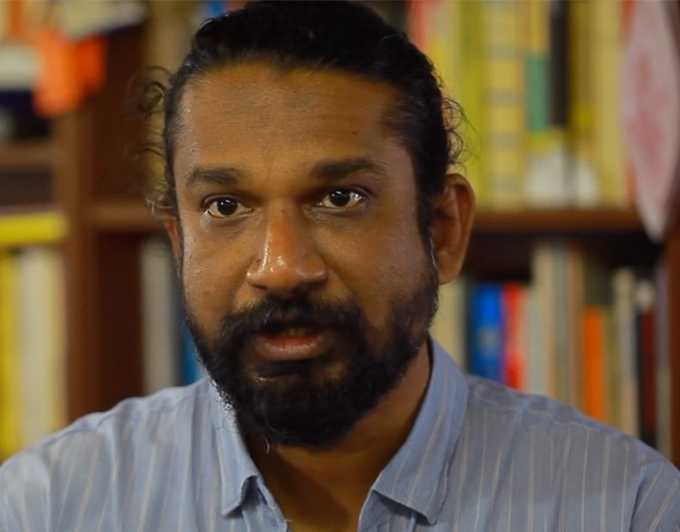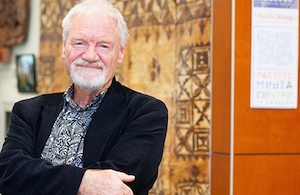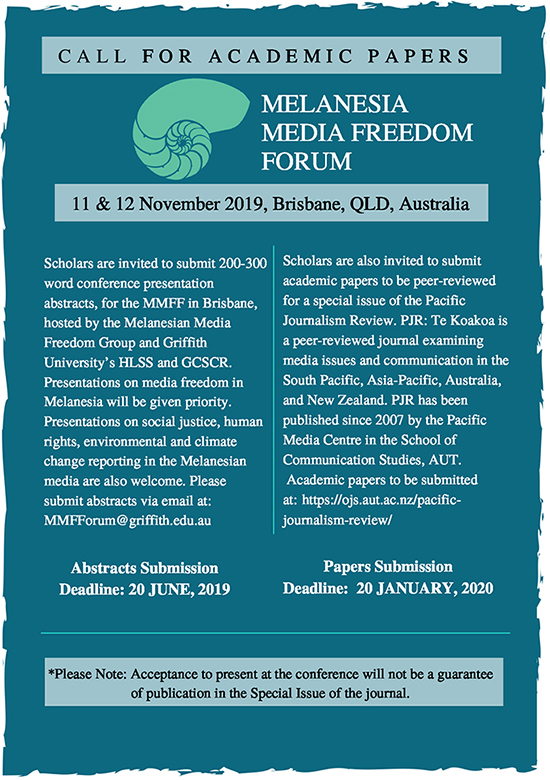
By Michael Andrew
Media freedom in Melanesia will be the focus of the next edition of Pacific Journalism Review in partnership the Melanesian Media Freedom Forum with academics and journalists invited to submit papers on the subject.
The research journal will focus on the political and socio-cultural challenges and constraints for a free press in Melanesia.
This will follow a special double edition due to be released this July.
READ MORE:Pacific media freedom and news ‘black holes’ worsen for World Press Freedom Day

PJR editor and director of the Pacific Media Centre Professor David Robie welcomed the opportunity to partner with the forum for the conference in November.
“Media freedom is tracking downwards at the moment and we need a challenging forum like this to clear the air over threats to the region,” he told Pacific Media Watch.
“Also, those courageous journalists in the region who are holding the line need to be celebrated for their work and this will be a tremendous opportunity to uphold media freedom.”
Papers can include but are not restricted to human rights journalism in Melanesia, gender and identity, environmental or climate change journalism, press freedom and the intersection between custom and indigenous knowledge in contemporary Fourth Estate practice.
Other topics
Other journalism topics will be publish as usual in themed editions of the journal.
The deadline for submissions is January 20, 2020.
Pacific Journalism Review is also encouraging presenters to take part in the Melanesian Media Freedom Forum in Brisbane on November 11/12, 2019.
Co-organised by Griffith University and the Melanesian Media Freedom Group, the forum will give priority to presentation on media freedom in the region, but also welcomes presentations on social justice, human rights, environmental and climate change reporting in the Melanesian media.
Forum co-organiser and director of the journalism programme at Griffith University, Dr Kasun Ubayasiri said the time was right for practitioners, academics and media freedom activists to come together to discuss the changing media landscape in Melanesia.
“We are hearing about increasing threats to media freedom in Melanesia from journalists, editors and media watchers across the sub-region,” he told Pacific Media Watch.
“There seems to be a spread in authoritarian attitudes, policies and practices by governments, often presented under the pretext of ensuring ‘stability’, and the apparent increase in intensity and frequency of threats seem to align with this shift in Melanesian politics.”
Incidents reported
Pacific Media Watch has reported on recent incidents involving such threats and policies in the region:
- + Last week in Papua New Guinea, which may face a change in government this week, an opposition politician warned the country’s two foreign-owned daily newspapers that the new government would “deal” to them.
- + n Indonesia, the government banned foreign journalists from covering recent electoral proceedings in West Papua.
Dr Ubayasiri, who is co-editing the next edition of PJR, said a free press was vital for a robust and healthy democracy and there was no logical reason to undermine it.
He said he had worked under media restrictions and censorship in South Asia as a former journalist.
“Media freedom is an issue very close to my heart.”

Chair of the Melanesian Media Freedom Group and MMFF co-organiser Dr Tess Newton Cain said she appreciated the challenges to a free media.
Difficult circumstances
“Based on my experience of living and working in Melanesia, I am very well aware of the difficult circumstances in which journalists and media outlets are operating.”
An expert on Melanesia, Dr Newton Cain said she hoped the forum would provide senior members of the industry with an opportunity to come together and address the challenges media freedom faced throughout the region.
Scholars are invited to submit 200-300 word abstracts for conference presentations.
The forum abstracts deadline is June 20, 2019.
This work is licensed under a Creative Commons Attribution-NonCommercial 3




